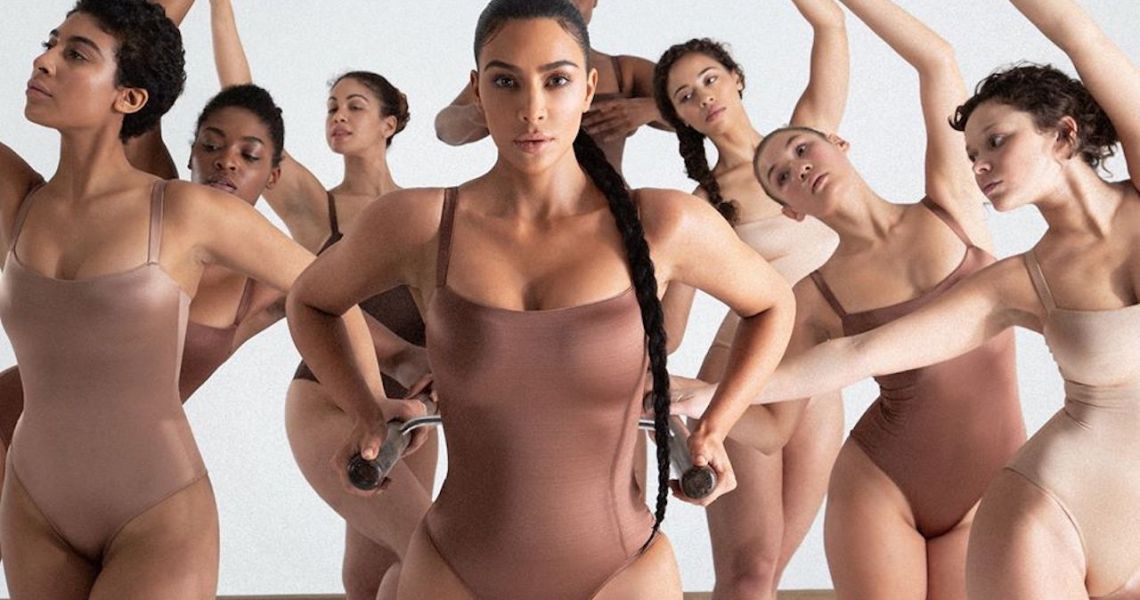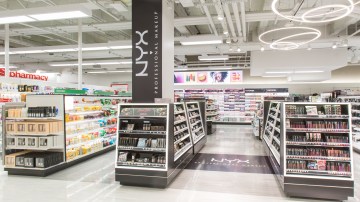The trend of direct-to-consumer brands broadening their sales channels to include wholesale partnerships is only growing. Of all the retailers looking to snag buzzy DTC brands, Nordstrom seems to be ahead of the rest.
Earlier this week, Nordstrom announced its latest DTC coup, becoming the first retail partner of Kim Kardashian West’s shapewear and underwear company, Skims. Skims has sold only direct-to-consumer since the brand launched in September. Beginning Feb. 5, Skims will be sold in 25 Nordstrom doors across the country, as well as on nordstrom.com. Nordstrom declined to comment.
“Nordstrom is renowned for its unmatched customer service and inclusive size offerings. It was essential to me that we launch with the full range of sizes and shades that Skims has to offer, which is a value shared by Nordstrom,” said Kim Kardashian West in a statement.
At a time when department stores are closing doors and consumers are buying more DTC, the focus on attracting these digital-first companies, and getting to them first, makes sense for Nordstrom. In Diffusion PR’s 2020 DTC Purchase Intent Index, 34% of Americans surveyed said they are cutting down on traditional retail in favor of DTC clothing and apparel, and 35% said they are gravitating toward DTC beauty, health and wellness products over those sold in traditional retail.
Nordstrom has brought brands including Thinx, Glossier, Everlane, Reformation and Hatch into its stores. Its latest undertaking, the 320,000-square-foot New York City flagship, houses many of these digital native brands, including a temporary Glossier pop-up shop.
“[Partnering with DTC companies] is a great strategy for Nordstrom,” said Harry Chemko, co-founder and CEO of e-commerce software company Elastic Path. “As they are competing with the other department stores out there, anything they can do that differentiates them is good. They’ve done a lot with getting exclusive rights from relevant brands, and that sets them apart from what others are doing.”
This concept — becoming the exclusive wholesale partner of brands while they’re buzzy — is a strategy others have taken as well, and it’s proven successful. Plus-size fashion retailer 11 Honoré has helped brands launch plus-size products. In exchange, 11 Honoré gets to sell their plus-size offerings exclusively, at least for a period of time.
A brand founder who wished to remain anonymous said Nordstrom has been trying to get her brand in its doors for several years, and that her company may soon cave and partner with the retailer on some level. She said her company has not entered into any wholesale partnerships at this point, in order to stay in control of the customer experience.
While the retailer doesn’t break out sales for specific brands, Nordstrom did call out its merchandise assortment as a growth driver in its latest earnings report, and said digital sales make up 34% of the business. Nordstrom reported back-to-back quarters of better-than-expected results. The company’s latest earnings report showed third-quarter net earnings were $126 million, up from $67 million during the same period in 2018.
While there are some potential challenges for smaller DTC brands moving into wholesale — from the need to ramp up production, if entering a large number of stores, to the pain points of losing consumer data and control — Nordstrom does have a good track record of bringing on big brands and keeping them as long-term partners.
Everlane, for example, first worked with Nordstrom in 2017 on the company’s Pop-In@Nordstrom concept (a rotating pop-up shop for buzzy brands). Back in October, the retailer launched a second pop-up with Everlane, after seeing success from its first round.
“Nordstrom has been at the forefront of embracing up-and-coming brands, because they recognize the opportunity to learn from their success and to tap into new, often younger audiences,” said Joe Rohrlich, chief revenue officer at digital marketing company Bazaarvoice. “For Nordstrom, these partnerships create a new reason for shoppers to make the destination trip in-store — an opportunity to see, touch, and feel these previously online DTC brands in-person before buying.”




